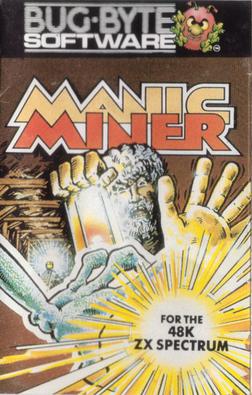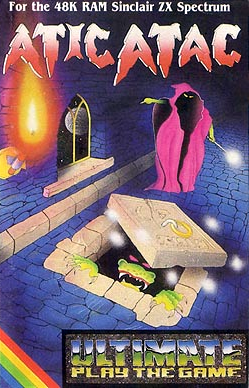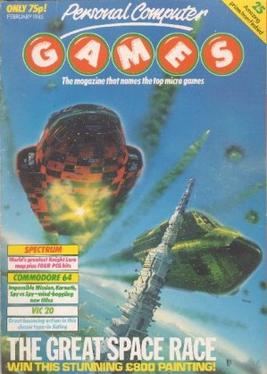
The ZX Spectrum is an 8-bit home computer developed and marketed by Sinclair Research. It was first released in the United Kingdom on 23 April 1982. Many official and unofficial clones were released around the world in the following years, most notably in Europe, the United States, and Eastern Bloc countries.
Ashby Computers and Graphics Limited, trading as Ultimate Play the Game, was a British video game developer and publisher, founded in 1982, by ex-arcade video game developers Tim and Chris Stamper. Ultimate released a series of successful games for the ZX Spectrum, Amstrad CPC, BBC Micro, MSX and Commodore 64 computers from 1983 until 1987. Ultimate are perhaps best remembered for the big-selling titles Jetpac and Sabre Wulf, each of which sold over 300,000 copies in 1983 and 1984 respectively, and their groundbreaking series of isometric arcade adventures using a technique termed Filmation. Knight Lore, the first of the Filmation games, has been retrospectively described in the press as "seminal ... revolutionary" (GamesTM), "one of the most successful and influential games of all time" (X360), and "probably ... the greatest single advance in the history of computer games" (Edge).
Andrew Nicholas Oliver and Philip Edward Oliver, together known as the Oliver Twins, are British twin brothers and video game designers.

Elite is a space trading video game. It was written and developed by David Braben and Ian Bell and originally published by Acornsoft for the BBC Micro and Acorn Electron computers in September 1984. Elite's open-ended game model, and revolutionary 3D graphics led to it being ported to virtually every contemporary home computer system and earned it a place as a classic and a genre maker in gaming history. The game's title derives from one of the player's goals of raising their combat rating to the exalted heights of "Elite".

MicroProse is an American video game publisher and developer founded by Bill Stealey, Sid Meier, and Andy Hollis in 1982. It developed and published numerous games, including starting the Civilization and X-COM series. Most of their internally developed titles were vehicle simulation and strategy games.

Manic Miner is a platform game written for the ZX Spectrum by Matthew Smith. It was published by Bug-Byte in 1983, then later the same year by Software Projects. The first game in the Miner Willy series, the design was inspired by Miner 2049er (1982) for the Atari 8-bit family. Retro Gamer called Manic Miner one of the most influential platform games of all time, and it has been ported to numerous home computers, video game consoles, and mobile phones.
An action-adventure game is a video game hybrid genre that combines core elements from both the action game and adventure game genres.

Jetpac is a shooter video game developed and published by Ultimate Play the Game and released for the ZX Spectrum and VIC-20 in 1983 and the BBC Micro in 1984. It is the first game to be released by Ultimate Play the Game, the company which later became Rare. The game follows Jetman as he must rebuild his rocket in order to explore different planets, while simultaneously defending against hostile aliens. It was written by Ultimate co-founder Chris Stamper with graphics designed by his brother, Tim Stamper. Reviewers praised Jetpac's presentation and gameplay, and it won "Game of the Year" at the Golden Joystick Awards in 1983.

Sensible Soccer, often called Sensi, is an association football video game series which was popular in the early 1990s and which still retains a following. It was developed by Sensible Software and first released for Amiga and Atari ST computers in 1992 as well as for the IBM PC compatibles. The series was created by Jon Hare and Chris Yates, as a successor to their previous football game MicroProse Soccer (1988), which in turn was inspired by the arcade video game Tehkan World Cup (1985).

Stunt Car Racer is a racing video game developed by Geoff Crammond. It was published in 1989 by MicroProse, under their MicroStyle and MicroPlay labels in the United Kingdom and in the United States, respectively. The game pits two racers on an elevated track on which they race in a head-to-head competition, with ramps they must correctly drive off as the main obstacle.

Chuckie Egg is a video game released by A&F Software in 1983 initially for the ZX Spectrum, BBC Micro, and Dragon 32/64. It was ported to the Commodore 64, Acorn Electron, MSX, Tatung Einstein, Amstrad CPC, and Atari 8-bit family. It was later updated for the Amiga, Atari ST, and IBM PC compatibles.

Atic Atac is an arcade-adventure video game developed and published by Ultimate Play the Game, released for the ZX Spectrum in 1983 and the BBC Micro in 1985. The game takes place within a castle in which the player must seek out the "Golden Key of ACG" by unlocking doors and avoiding enemies. It was Ultimate's second game to require 48K of RAM; most of their previous games for the Spectrum ran on unexpanded 16K models.

Personal Computer Games was a multi-format UK computer games magazine of the early/mid-1980s published by VNU.
Alligata Software Ltd. was a computer games developer and publisher based in Sheffield in the UK in the 1980s.

The Golden Joystick Awards, also known as the People's Gaming Awards, is a video game award ceremony; it awards the best video games of the year, as voted for originally by the British general public, but is now a global event that can be voted online via GamesRadar+. As of 2023, the ceremony was in its 41st year. It is the longest-running video game award ceremony, launched in 1983, and the second-oldest video game award ceremony after the Arcade Awards, launched in 1981.

MicroProse Soccer is an association football video game published by MicroProse in 1988. The original Commodore 64 version was developed by Sensible Software and ported to other systems. In the United States, the game was released as Keith Van Eron's Pro Soccer, named after Keith Van Eron.

The British Broadcasting Corporation Microcomputer System, or BBC Micro, is a series of Microcomputers designed and built by Acorn Computers Limited in the 1980s for Computer Literacy Project of the BBC. Designed with an emphasis on education, it was notable for its ruggedness, expandability, and the quality of its operating system. An accompanying 1982 television series, The Computer Programme, featuring Chris Serle learning to use the machine, was broadcast on BBC2.
The United Kingdom has the largest video game sector in Europe. By revenue, the UK had the second largest video game market in Europe in 2022 after Germany, and the sixth largest globally. By sales, it is Europe's largest market, having overtaken Germany in 2022. The UK video game market was worth £7.16 billion in 2021, a 2% increase over the previous year.













